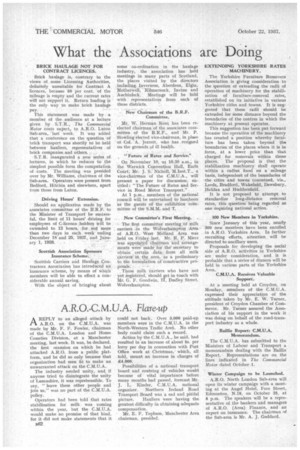A.R.O.-C.M.U.A. Flare-up
Page 84

If you've noticed an error in this article please click here to report it so we can fix it.
A REPLY to an alleged attack by
A.R.O. on the C.M.U.A. was made by Mr. F. F. Fowler, chairman of the C.M.U.A. London and Home Counties Division, at a Manchester meeting, last week. It was, he declared. the first occasion on which he had attacked A.R.O. from a public platform, and he did so only because that organization had seen fit to make an unwarranted attack on the C.M.U.A.
The industry needed unity, and if anyone tried to disintegrate the unity of Lancashire, it was reprehensible. To say, "leave these other people and join us," was no part of the C.M.U.A. policy.
Operators had been told that rates stabilization for milk was coming within the year, but the C.M.U.A. would make no promise of that kind, for it did not make statements that it could not back. Over 3,000 paid-up members were in the C.M.U.A. in the North-Western Traffic Area. No other body could claim such a record.
Action by the C.M.U.A., he said, had resulted in an increase of about 5s. per lorry per day in connection with Post Office work at Christmas,' which, all told, meant an increase in charges of £4.000.
Possibilities of a national transport board and routeing of vehicles would become of vital importance before many months had passed, forecast Mr. J. L. Kinder, C.M.U.A. national organizer. Northern Ireland Road Transport Board was a sad and pitiful
picture. Hauliers were having the greatest difficulty in obtaining adequate compensation.
Mr. E. F. Topham, Manchester Area chairman, presided.
























































































































